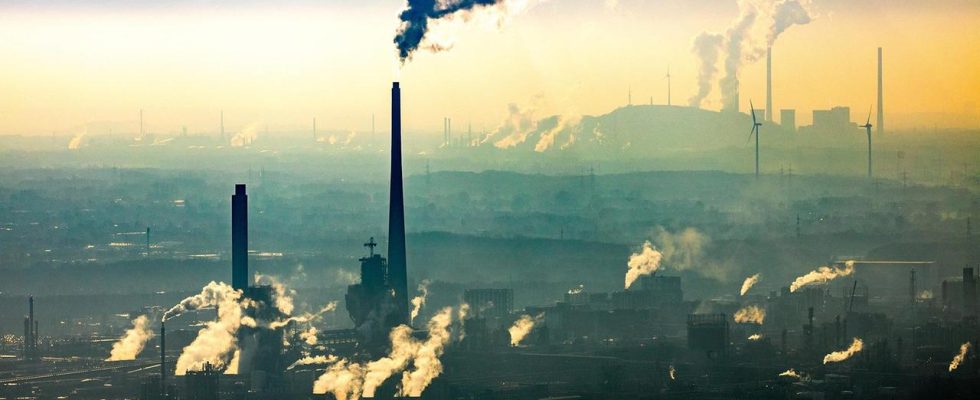background
The German economy is developing worse than in the rest of the EU. Nevertheless, Microsoft wants to invest billions in this country. Is Germany a better location than its reputation?
What problems does Germany have as a location? She gets this question ARD-Broadcast Plus minus a surprising answer from the chief economist of the Federation of German Industries (BDI), Klaus Klaus Günter Deutsch. He explains that Germany is now a very interesting location again, especially in the area of high technology, as can be seen in many areas in which large companies from all over the world are investing here. The complaint about high energy prices in Germany now seems outdated.
In fact, Microsoft is building its new energy-hungry data centers – completely without government subsidies – in the Rhenish coal region, where the last coal-fired power plants will be shut down in a few years, and not in Belgium or France, where nuclear power supposedly ensures lower electricity costs.
Electricity costs are high compared to the rest of the world
In a European comparison of real electricity generation costs, these are currently lower than in Germany in only five European countries. France has only had a price advantage of 0.1 cent since the beginning of the year. In nuclear-friendly Belgium, electricity is even 0.2 cents more expensive than here. In 21 other EU countries, prices are often significantly higher: in the coal stronghold of Poland, a full 1.6 cents per kilowatt hour.
The BDI also confirms that the energy price crisis triggered by the Russian war of aggression has largely been overcome. However, according to Deutsch, Europe as a whole remains a difficult location for energy-intensive production: “Compared to the United States and the People’s Republic of China, it is still comparatively expensive and this means that energy-intensive companies in particular are increasingly looking to the United States for future investments .” Also because one can expect that the energy supply there will remain significantly cheaper in the long term.
Competition of subsidies.
But the USA doesn’t just lure people with cheaper electricity. President Joe Biden is currently offering massive tax breaks to investors who invest in promising, climate-friendly projects and is accepting increasing national debt in return. Volkswagen, the solar producer Meyer Burger and many other European companies now prefer to invest there rather than in Germany.
A year ago, the federal government lured chip producer Intel with massive subsidies. This path is now blocked. After a lawsuit by the Union, the Federal Constitutional Court banned the reallocation of unused funds from the Corona fund, the FDP insists on adhering to the debt brake, and the coalition under Chancellor Olaf Scholz must massively reduce its plans to promote industry.
Germany has the lowest national debt among the ten largest industrial nations in the world, less than the People’s Republic of China, barely half as much as the USA, but – unlike Biden – can hardly attract investments with taxpayers’ money.
Slowing bureaucracy
Many economists consider subsidies for industrial settlements to be of little help anyway, and many entrepreneurs also see more pressing problems: The medium-sized Hamburg company “HOBUM Oleochemicals” produces specialty chemicals primarily from renewable raw materials and requires a lot of process heat for this. There are concrete plans to switch from natural gas to hydrogen in the near future; The line for this is currently being planned.
But during the crisis, she first had to purchase new burners that could be fired with oil if the gas supply failed. Owner Arnold Mergell reports that these burners are in use hundreds of times across the country and are approved by TÜV; Nevertheless, they had to go through a complete approval process and only completed it when the gas crisis had long since been overcome.
At the same time, he must certify every chemical product according to the rules of European REACH legislation, which is constantly being tightened. Each certificate requires lengthy external examinations and costs hundreds of thousands of euros. He recently removed five products from the range that were only produced in small quantities. It is particularly bitter when such substances are allowed to continue to be produced in the rest of the world – and are processed into products that can then be easily imported to Europe.
More bureaucracy Supply Chain Act
The supply chain law currently being discussed is intended to prevent preliminary products manufactured under inhumane conditions from being used. It officially only applies to large companies with more than 3,000 employees. But his small company is also part of supply chains. His major customers now sent him extensive questionnaires. So he now has to demand proof from suppliers whose oil he processes that the plant from which it comes was produced in a morally safe manner.
In February, the FDP prevented the EU from adopting such a supply chain regulation. That doesn’t help the German entrepreneur. The EU wanted to adopt, with minor changes, a law that was introduced in Germany by the Merkel government – and now continues to apply in this country.
Improvement in sight?
Both EU Commission President Ursula von der Leyen and Chancellor Scholz’s federal government had promised to thoroughly clear out the jungle of slowing regulations. Little has happened in this regard so far.
The BDI chief economist is nevertheless surprisingly calm about the future of the German economy. It is particularly export-oriented and is therefore particularly affected by the shocks to the global economy and declining global trade, explains Deutsch. It simply takes them a little longer to get out of the weak economic phase. But it is also clear that better framework conditions would help.

